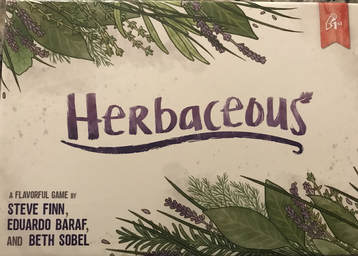 What is this game about? Herbaceous, from Pencil First Games, is a lushly-illustrated game about gathering and potting herbs. To win, players need to collect sets of herbs and plant them in ways that maximize the points they score. Each player only has four pots, and each pot can only hold certain types and combinations of plants. For example, one pot holds multiple pairs of herbs, one pot holds a lot of the same herb, and one holds one of each herb. There is also a glass jar that can be used for special, higher-scoring herbs. On top of limits on what they can plant where, players are only able to use each pot one time—meaning they have only one shot at scoring for each pot. Players can collect herbs in their private gardens, but they are also free to help themselves to a "community garden," which consists of herb cards that all players can take and use. Another aspect of strategy in Herbaceous is deciding when to grab herbs from the community garden. If you take cards and plant them too soon, you could miss out on better scoring opportunities. But if you wait too long, someone else could grab those herbs before you do. 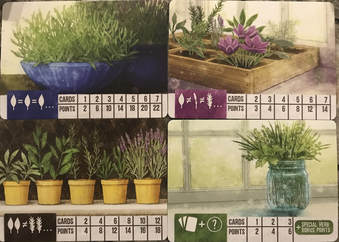 You only have four pots to plant in, and each scores differently. You only have four pots to plant in, and each scores differently. How does it play solo? Herbaceous comes with a solo variant in-box. To play solo, you shuffle the herb deck and remove half of the herb cards from the game. On each turn, you draw three cards, one at a time. You have to choose where to place each card as you draw it: One goes to your private garden, one goes to the community garden, and one goes to the discard pile. Discarded cards are removed permanently from the game, and there are limits to what you can put in the community garden. Once a fifth herb card would be placed there, all of its cards are discarded and you lose the chance to use them. This mechanic forces you to make quick decisions about what you will pot and when. Overall Thoughts Herbaceous is an absolutely beautiful game, and it can also be very relaxing. I like playing it in a group because Herbaceous has enough tension to be a real game, but it's still a chill filler game that is quick to play and easy to teach. For me, however, the solo mode is lacking. Taking half of the cards out of the deck leaves you without the ability to gauge how much of any particular herb might be left. You can wait and wait hoping to get a good combo, but there is a possibility that the cards you need just aren't there—and you have no way of knowing that. In a group game this doesn't matter as much, because your goal is to beat another player. But the solo mode is about trying to beat your own score, and there will be game setups that won't actually allow that, no matter how well you play. Additionally, the guarantee that the community garden will be wiped out every time a fifth card would be placed in it forces you to pot early and often, which makes sense in terms of creating tension, but it is also more artificial than worrying about what one of your neighbors will take from the community garden—and when. 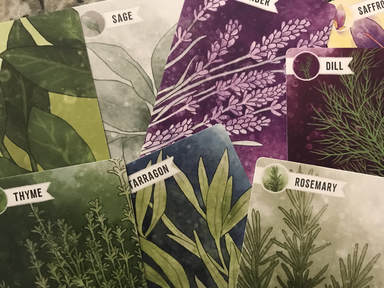 There is no denying how gorgeous this art is. There is no denying how gorgeous this art is. Overall, my issue with the solo variant of Herbaceous is that I can't actually feel proud of my higher scores, because they don't represent any particular successful strategy on my part. I'm just lucking out. This is true of other solo fillers I enjoy, like The Game, but I feel like Herbaceous asks me to make a lot of decisions—and I like my decisions in a game to be a bit more meaningful. Do I recommend it? For purely solo play, I wouldn't recommend Herbaceous. It's not bad, and there are lots of things to like about it. But I also think you can do better where solo games are concerned—in fact, Sunset over Water, from the same design team, is another relaxing filler game with a significantly better solo variant. Overall Rating: 2.5 stars Rating Scale: 5 stars — I love it! 4 stars — I really like it. 3 stars — I like it. 2 stars — It's okay. 1 star — Meh.
1 Comment
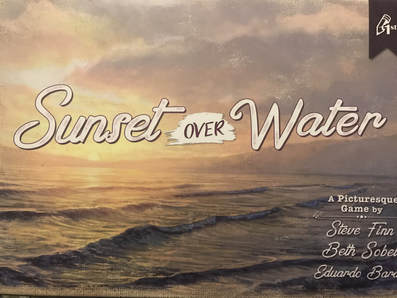 To watch a quick tutorial for this game, click here. What is this game about? Sunset Over Water, from Pencil First Games, is a game about creating art and selling it. Every day, players choose a start time, travel through beautiful landscapes (represented by gorgeously-illustrated cards), collect scenes to paint, and then attempt to meet the requirements set out by commission cards. As they move, players may choose to "paint" the landscapes they see by collecting landscape cards they have traveled through. Commission cards then allow painters to sell their work and amass victory points. There are plenty of decisions to be made as players try to beat each other to the most desirable nature scenes, strategically choose commissions to fulfill, and compete for "daily goal" cards that add extra opportunities to gain points. The cards in Sunset Over Water are gorgeous, but pay attention to more than just the art—each card has a symbol or symbols on it that can help you meet the demands of commission cards. The symbols on a player's leftover cards can also be converted to victory points at a rate of two to one at the end of the game. 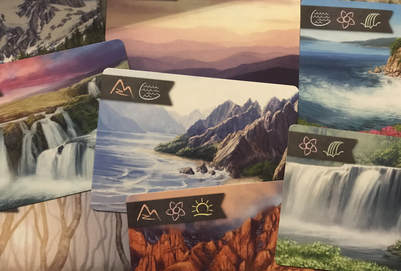 Beth Sobel is killing it with this art. Beth Sobel is killing it with this art. How does it play solo? Sunset Over Water has an in-box solo mode designed by Keith Matejka, who also designed the solitaire variant for Herbaceous. The one-player version of Sunset Over Water is a beat-your-own-score challenge that is similar to the main game, with some key differences. In the multiplayer game, landscapes are replenished at the end of each round. In the solo game, however, players can only replace landscape cards by choosing certain start times or by moving through "ranger station" cards in the play area. This means that movement needs to be planned strategically—you should wait to replenish cards until doing so will actually benefit you, but you also don't want to risk wasting a turn because there aren't enough landscapes left to paint. Choosing later start times can also cause you to lose valuable commissions, so there are several interesting choices to make. Will you play a card that gives you better options for movement and painting acquisition? Or are you trying to complete a particular commission card that you can't afford to lose? 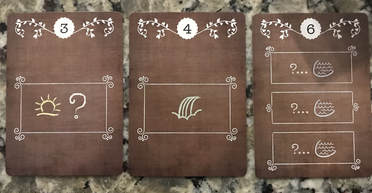 Commission cards tell you which paintings you need to collect to satisfy potential buyers. Commission cards tell you which paintings you need to collect to satisfy potential buyers. Overall Thoughts The solo variant of Sunset Over Water is delightful. You have engaging decisions to make, and you make them against a beautiful and calming backdrop, thanks to Beth Sobel's excellent artwork. Some players do not enjoy beat-your-own-score solo games, but I like this one. I really enjoy plotting my movements, scheming to pick up commission cards, and trying to make the optimal moves given the information I have at any particular time. Do I recommend it? Yes, I recommend Sunset Over Water for solo play. It's beautiful, calming, and thought-provoking enough to provide a satisfying solo experience. It also clocks in at only 20 minutes or so, which makes it ideal for work night or lunch break gaming. Overall Rating: 3.5 stars Rating Scale: 5 stars — I love it! 4 stars — I really like it. 3 stars — I like it. 2 stars — It's okay. 1 star — Meh. 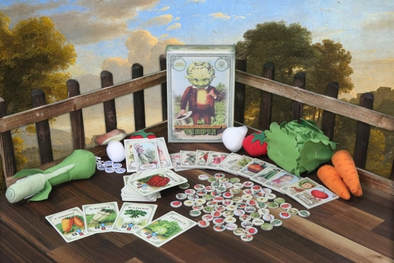 As usual, there are several interesting Kickstarter projects out there for solo board gamers! I'm only featuring a couple this week, since they're the ones I am particularly interested in. 1) Mr. Cabbagehead's Garden This is a quirky game about anthropomorphized vegetables, with art that looks like it was ripped straight out of an old-timey children's book. (Apparently it was actually inspired by Victorian-era seed packets!) Your goal is to keep Mr. Cabbagehead's garden safe from thieves so that he can finally win a gardening competition. During each turn, you will have a planting phase in which you draw and plant vegetable cards. Then you'll have to deal with a neighbor phase, in which one of your rude neighbors comes in and interferes with your hard work. This game has had a great track record as a PnP game for a couple of years now, and it's designed by Todd Sanders, who has a sterling reputation as a solo game designer. (Another of his recent KS projects was Pulp Detective.) 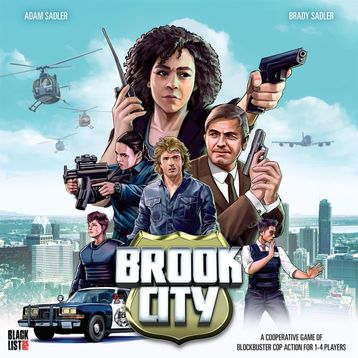 2) Brook City Brook City is basically a buddy cop board game in which you (and friends, if you want) work together to keep Brook City crime-free. In this game, you play as police officers who take on the city's criminal underworld using varying player powers and maximizing personal decks of cards. Players will also deal with obstacles dealt by a criminal deck and work through a case deck that represents what the players' goals are. In addition to the decks of cards, this game comes with several miniatures and an elaborate board that depicts the city. You can even commandeer better vehicles, Grand Theft Auto style. If your regular police cruiser isn't good enough for you, go ahead and upgrade! I am definitely interested in this project. The only issue for me is the price—the base game is $89. 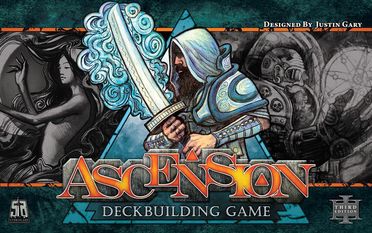 What is this game about? Ascension is an early deck building game designed by former pro Magic: The Gathering players. It is a game in which players begin with the same cards available to them, but quickly build differentiated decks as they acquire new cards from different factions. The main currencies of the game are power (used to defeat monster cards) and runes (used to buy hero and construct cards). The ultimate goal is to acquire cards that allow you to end up with the most honor points at the end of the game. Cards are purchased from a market row that is formed by drawing cards from a common deck. Part of winning the game is being flexible and responding to what cards are actually available, regardless of any overarching strategies you want to try. There is an entire story behind Ascension, which has released several internally consistent blocks of expansions over the years. I have only played games from the first block: Ascension: Deckbuilding Game, Ascension: Storm of Souls, and Ascension: Return of the Fallen. How does it play solo? Ascension has an official solo variant that was released with the Storm of Souls expansion. To play solo, players battle against an "opponent" who gains points by consuming the two rightmost cards on the market row at the end of each turn. Strategy in the solo variant of Ascension heavily depends on being able to deny high-value cards to the opponent, as well as to acquire them yourself. 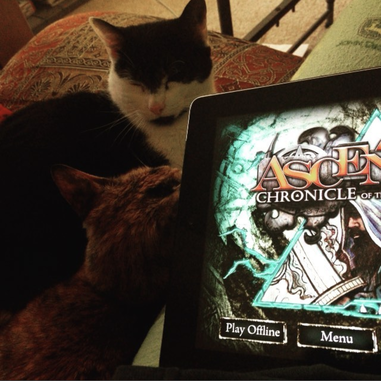 The app is fun, though I must say the experience is enhanced by cats. The app is fun, though I must say the experience is enhanced by cats. Overall Thoughts I used to really enjoy the solo variant of Ascension, but I almost never take it off of the shelf anymore. I have discovered too many other, more thematically robust deck builders that I would rather play instead. The solo variant of Ascension is light and can be entertaining, but I would not purchase the game just for solo mode. Because your opponent in that version of the game endlessly devours cards, you don't have the time or space to develop interesting strategies or experiment with card interactions the way you would when facing off against a human player. That ultimately made the solo game less appealing to me. One way to play Ascension solo without the physical game, however, is to play it on the app—an experience I do still recommend. The app has all expansions and decent AI, as well as the option to play against other people online if you are curious about branching out from solo play. Do I recommend it? I do not recommend that you purchase Ascension with the intention of playing it as a primarily solo game. I do recommend the app, and I think that Ascension is fun when played against other people. Overall Rating: 2 stars (3 stars if you're playing on the app) Rating Scale: 5 stars: I love it! 4 stars: I really like it. 3 stars: I like it. 2 stars: It's okay. 1 star: Meh. 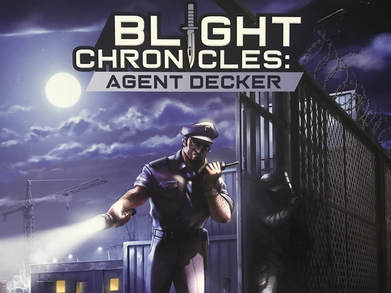 Full disclosure: Board&Dice sent me a prototype copy of Blight Chronicles: Agent Decker so that I could create this preview. What is Blight Chronicles: Agent Decker about? Blight Chronicles: Agent Decker is a solo-only, story-driven deck building game in which you play a specially trained agent whose job is complete a mission. Each mission is divided into several stages, and at the end of each stage, you will be able to make branching choices that affect the challenges you will face and that give the game added replayability. Blight Chronicles includes several interesting mechanics that give it special flavor as a deck builder and that fit very well with the stealth/infiltration theme. Each time you confront an obstacle, you have a choice to make: Will you eliminate that guard or that security camera, which will give you a new card with a new ability to add to your deck? Or will you choose to "knock out" the obstacle instead, so that you don't benefit from a new card but do maintain a lower profile? As you make these in-game choices, you will need to take into account your visibility and suspicion levels, because if you don't stay under the radar, you will fail the mission. You also have choices to make about equipment cards, which are tools and outfits that will help you successfully reach new stages. You can only use so many of them at a time, so it's up to you to choose which tools to equip and which outfit to wear. And don't think that you get to refresh everything at the end of a stage—both your useful cards and your suspicion levels will carry over from stage to stage until the entire mission is complete. The choices you make earlier in the game may come back to haunt you. 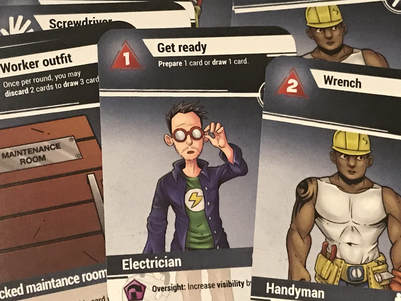 Obstacles can be eliminated and turned into assets—or quietly knocked out. Also, why is the Handyman's shirt so tight that it's getting sucked into his belly button? Obstacles can be eliminated and turned into assets—or quietly knocked out. Also, why is the Handyman's shirt so tight that it's getting sucked into his belly button? What I like about Blight Chronicles: Agent Decker I am definitely feeling this game. I particularly like both deck builders and board games that cater to solo players, so I am excited to see a product like this one on the market. I also enjoy stealth-heavy mechanics and themes, so I am always very interested to see how stealth can be implemented in board games. Most importantly, Blight Chronicles plays well. I have an easy time getting into secret agent mode. I can imagine myself taking out camera drones, and I agonize over whether to knock out an obstacle or get aggressive and eliminate it. I see so much potential in the branching pathways, and this system has room for a lot of interesting storylines. I truly cannot wait to see where this game goes. I also love that Blight Chronicles does so much with only a few decks of cards. So many games seem to demand elaborate miniatures and sprawling boards, but Blight Chronicles manages to immerse me and make me feel like I am sneaking around just by letting me visualize myself inside of an enemy complex. That delights me. And with the ability to save between stages, I also find that it's easy to fit this game into my life. I am going through a very busy couple of weeks, but I have still had time to sneak play sessions in here and there because the game accommodates that. 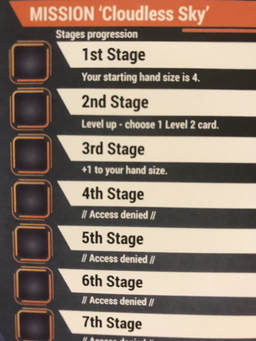 My demo copy only lets me see so much. I'm curious about what will happen next! My demo copy only lets me see so much. I'm curious about what will happen next! Possible Concerns about Blight Chronicles: Agent Decker Because Blight Chronicles is selling itself as a story-driven game, I want to feel sure that there will be a lot of story. Retrying stages just to test out different strategies will only take me so far, and I am going to be disappointed if it does not get ongoing publisher support. Fortunately, Board&Dice has been up front about seeing Blight Chronicles as the start of a much longer adventure, so I am very excited to see where this will go. Aside from the longevity discussion, I have a few quibbles. The art for this game is pretty blah, so don't go into it expecting a feast for the eyes. This game also has some difficulty swings depending on whether you manage to pull the right cards at the right time, or whether you draw a lot of cards off of the obstacle deck that have devastating effects. Blight Chronicles requires a lot of attention to the card text because several of the captions impact other cards that are in play. If you don't like keeping track of multiple card interactions, Blight Chronicles might not be as fun for you. (I personally don't mind--Sentinels of the Multiverse is among my all-time favorite games.) Given that the game is played campaign-style and is comprised of several missions, it can also be pretty frustrating to lose. If you generally feel that you should be able to play story games all the way through without too much trouble, Blight Chronicles might disappoint you. Should I back it? Blight Chronicles: Agent Decker is a definite back for me. I love deck builders, I love ongoing campaigns, and I love games that are made just for me as a solo player. I am also having a lot of fun playing my demo copy, and I am hungry for more. In my opinion, this is a good game with a ton of potential for future growth. If, however, you don't like games where luck can go against you or where you have to keep track of various card interactions, you might not enjoy it as much. Feel free to check out my playthrough on YouTube! |
AuthorMy name is Liz Davidson, and I play solo board games. A lot of solo board games... Archives
August 2021
Categories
All
|
 RSS Feed
RSS Feed